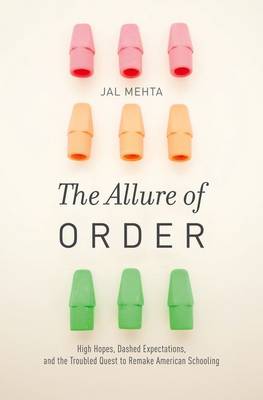Studies in Postwar American Political Development
1 total work
Worries about the quality of public schooling in America are not new. Present since the mid-nineteenth century, the issue became a perennial one after 1918, the year in which elementary school attendance became compulsory in every state. The Allure of Order traces the cyclical efforts to 'order' American schooling over the course of the twentieth century, from 1920s reform efforts up through No Child Left Behind and the current school accountability
movement. The book explores why reformers from both the left and right have repeatedly placed such high hopes in these reforms and why teachers and schools have been unable to resist these external reformers. As he shows, the measurable has repeatedly crowded out the educationally meaningful, and reforms have never
realized the hopes placed in them. In each reform effort, higher-status professionals have drawn from policies outside the educational arena and ridden roughshod over the teaching profession, which has remained, as he puts it, under-professionalized. Outside reformers looked to fix schools using Taylorist principles in the 1920s, Department of Defense metrics in the 1960s, and maxims from management gurus in our own era. In each case, a largely male administrative elite dictated to a largely
feminized teaching profession that had little say over policy.
In fact, the whole American educational sector was put together backwards: we draw less than our most able people to teaching, underprofessionalize the field, equip teachers with a weak knowledge base, put them in a highly challenging situation because of a comparatively weak welfare state, and then, when they don't achieve the results we seek, impose increasingly stringent regimes of external accountability. Mehta proposes that we do the reverse: draw more talented people into teaching, train
them well, support their efforts through a more robust welfare state, and stimulate a cycle of increased trust and lessening control. This is the strategy of a number of the countries that outpace the United States on international assessments, and it is essentially the opposite of America's
preferred strategy. Empirically rich and sweeping in scope, The Allure of Order will force anyone who cares about educational policy to re-examine his or her fundamental beliefs about the problems plaguing our schools.
movement. The book explores why reformers from both the left and right have repeatedly placed such high hopes in these reforms and why teachers and schools have been unable to resist these external reformers. As he shows, the measurable has repeatedly crowded out the educationally meaningful, and reforms have never
realized the hopes placed in them. In each reform effort, higher-status professionals have drawn from policies outside the educational arena and ridden roughshod over the teaching profession, which has remained, as he puts it, under-professionalized. Outside reformers looked to fix schools using Taylorist principles in the 1920s, Department of Defense metrics in the 1960s, and maxims from management gurus in our own era. In each case, a largely male administrative elite dictated to a largely
feminized teaching profession that had little say over policy.
In fact, the whole American educational sector was put together backwards: we draw less than our most able people to teaching, underprofessionalize the field, equip teachers with a weak knowledge base, put them in a highly challenging situation because of a comparatively weak welfare state, and then, when they don't achieve the results we seek, impose increasingly stringent regimes of external accountability. Mehta proposes that we do the reverse: draw more talented people into teaching, train
them well, support their efforts through a more robust welfare state, and stimulate a cycle of increased trust and lessening control. This is the strategy of a number of the countries that outpace the United States on international assessments, and it is essentially the opposite of America's
preferred strategy. Empirically rich and sweeping in scope, The Allure of Order will force anyone who cares about educational policy to re-examine his or her fundamental beliefs about the problems plaguing our schools.
